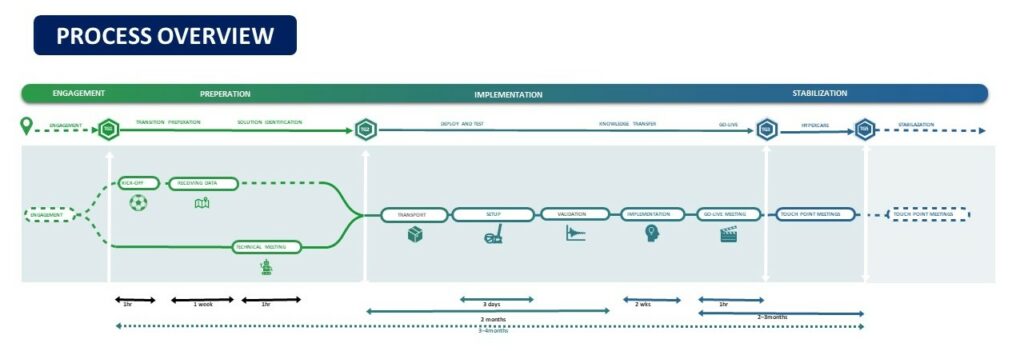Say you brew beer in more than 150 breweries around the world. To meet growing demand and strengthen collaboration between production sites, a digital transformation is taking place within the supply chain. To facilitate this, a portfolio has been set up on a global level with various products being implemented within the originally traditional production sites. These include an app to resolve process deviations, robots that help with inspections, cleaning and quality assurance and various dashboards to bottle beer more efficiently. But how do you implement these various products in a uniform way, across 150 completely different breweries?
IMPROVEN was asked to develop a methodology to roll out the diverse products in a standardised way at breweries worldwide. Based on the best practices from IMPROVEN's Pragmatic Project Management methodology and various supply chain processes, IMPROVEN created an integrally applicable roll-out methodology, which has now been used for years. This article explains the IMPROVEN roll-out methodology and describes why it is so widely applicable.
The IMPROVEN roll-out methodology
The IMPROVEN roll-out methodology has 4 phases; Engagement, Preparation, Implementation and Stabilisation. As with Pragmatic Project Management, the basis is a phased project approach, with toll gates after each phase to ensure that all deliverables have been delivered. At the same time, work can be short-cycled within the phases to keep the methodology broadly applicable and tailor implementation to local conditions. You can imagine that implementing a robot or dashboarding is easier in a brewery with a state-of-the-art IT landscape, than at a brewery where they are happy that the internet connection does not go down several times a day. An annual schedule is established at portfolio level for where and when which products will be implemented.
Engagement
The roll-out process starts with initiating the project by identifying and engaging the right stakeholders at the local brewery, to define roles and responsibilities. Essential is the commitment of the client to make the project a success and to ensure that all resources (staff and budget) are available to implement the project. Project governance is established and it is ensured that the local, regional and global project organisation are aligned. Once the approach is clear and agreements on budget, timelines and dependencies are in place, the next phase can begin.
Preparation
Transition Preparation
In the preparation phase, the business case is drawn up together with the local project team and all preconditions are checked. In addition, the current situation (think of local processes and roles) is mapped out so that the product can be tailored to it. The phase can be concluded when there is clarity on all activities that will take place within the roll-out.
Solution Identification
To make the same product work at different breweries (a brewery in Asia works differently from one in Africa), detailed consideration is given to what adjustments are needed to make a globally designed product work in unique situations. Local project teams consider how their processes and roles are currently set up and what impact the new product will have on them. With this as input, a plan is drawn up to adjust these processes and roles so that the products can be successfully implemented.
Implementation
Deploy & Test
Once the implementation plan is established and tailored to the current situation of the local brewery, the implementation phase can begin. In this phase, the product is implemented, configured and then tested by the project team. During this phase, project management is important, the alignment between the supplier and the local project team needs to be coordinated and monitored. Short cyclical work is done in sprint sessions with milestones so that adjustments can easily be made and the product is constantly evaluated to arrive at the right local solution. As a result, the implementation fits well with the conditions in the local brewery.
Knowledge Transfer
Perhaps the most important step of a project: sharing and securing knowledge. This phase focuses on the 'train the trainer' principle: the brewery's project team is intensively trained after which a plan is made together to train the end users. Here, the IMPROVEN roll-out methodology provides support for change management, knowledge assurance and inclusion in the local processes. An extra challenge is the international character of the client, where projects are implemented in a diversity of cultures. As soon as the product has been implemented, knowledge has been transferred and a training plan has been drawn up, we check whether the predefined business case has been met, so that the product can be taken into use. With all stakeholders, this phase is officially concluded in a Go-Live meeting, where agreement is given on all deliverables.
Stabilisation
Hypercare
The products have been implemented, the trainers have been trained. Now it is up to the project team to disseminate the knowledge about the new practices and products within the brewery. This involves using the training plan from the previous phase to ensure that the adoption of the different products goes well within the different areas in the brewery. If the adoption goes well, it is time to close the hypercare phase and support from the global project team stops.
Stabilisation
During the stabilisation phase, first the business case is validated and compared with the actual realised value of the product. Then, the use of the products within the brewery is looked at again. Are the products being used as intended? Are all employees trained? And perhaps most importantly, has the new way of working become part of the standard way of working? If these questions can all be answered 'yes', it is time to officially complete the project and take ownership to the end user.
Example of a process review of the roll-out methodology
Success factors of the IMPROVEN roll-out methodology
The strength of this methodology lies in its simplicity: because not too much is laid down but the phases are standardised, the methodology is easily applicable to a multitude of products within a variety of organisations and environments. The toll gates ensure that essential checks are done at the right times and the necessary stakeholders are on board, while the short-cycle methodology ensures that customisation can be done when needed.
The IMPROVEN roll-out methodology is thus multi-applicable and can be used for the implementation of all kinds of different products, at a diversity of international (production) locations. The roll-out methodology is continuously improved with the other IMPROVEN expertises in change management and project and portfolio management.























